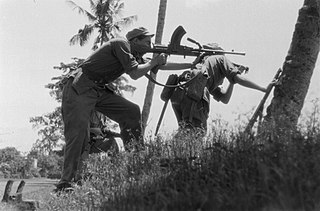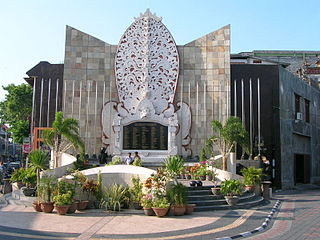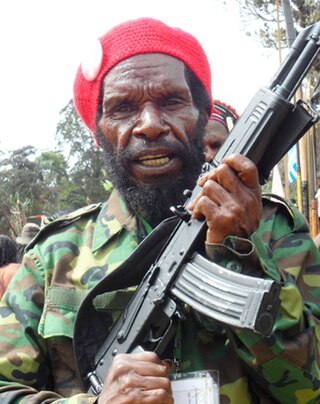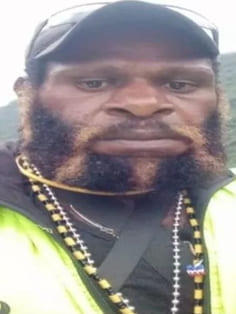
The Free Papua Movement or Free Papua Organization is a name given to a separatist movement that aims to separate West Papua from Indonesia and establish an independent state in the region. The territory is currently divided into six Indonesian provinces of Central Papua, Highland Papua, Papua, South Papua, Southwest Papua, and West Papua, also formerly known as Papua, Irian Jaya and West Irian.

In security studies and international relations, a police action is a military action undertaken without a formal declaration of war. In the 21st century, the term has been largely supplanted by "counter-insurgency". Since World War II, formal declarations of war have been rare, especially military actions conducted by the Global North during the Cold War. Rather, nations involved in military conflict sometimes describe the conflict by fighting the war under the auspices of a "police action" to show that it is a limited military operation, different from total war.

Terrorism in Indonesia refer to acts of terrorism that take place within Indonesia or attacks on Indonesian people or interests abroad. These acts of terrorism often target the government of Indonesia or foreigners in Indonesia, most notably Western visitors, especially those from the United States and Australia.

Benny Wenda is a West Papuan independence leader and Chairman of the United Liberation Movement for West Papua (ULMWP). He is an international lobbyist for the independence of West Papua from Indonesia. He lives in exile in the United Kingdom. In 2003 he was granted political asylum by the British government following his escape from custody while on trial.

The Papua conflict is an ongoing conflict in Western New Guinea (Papua) between Indonesia and the Free Papua Movement. Subsequent to the withdrawal of the Dutch administration from the Netherlands New Guinea in 1962 and implementation of Indonesian administration in 1963, the Free Papua Movement has conducted a low-intensity guerrilla war against Indonesia by targeting its military and police, along with ordinary Indonesian civilians.
Ilaga is the name of a small town and a farming valley in Central Papua, Indonesia, with an elevation of 2,286 m (7,500 ft). It is also the capital of a government district (kecamatan) of the same name, and of the newly created (2008) Puncak Regency. Most of the residents of the area belong to the Lani tribe. It has a small airport and a tiny community of non-Papuan traders and government officials from other parts of Indonesia. A river of the same name runs through the valley, and is a tributary of the Ilorong. The valley lies about midway between the Enarotali and Baliem valleys.

Kelly Kwalik was a senior separatist leader and military commander with the Free Papua Movement (OPM), a separatist organization based in Indonesia's Papua Province.
Yusak Pakage is an Indonesian activist for Papuan independence, best known for his 2005–2010 imprisonment for raising the pro-independence Morning Star flag.
The Mapenduma hostage crisis began on January 8th 1996 after the Free Papua Movement took 26 members of a World Wildlife Fund research mission captive at Mapenduma, Jayawijaya in Irian Jaya, Indonesia. The hostages were subsequently moved to Geselama. The International Committee of the Red Cross acted as an intermediary between the OPM and the Indonesian authorities. Fifteen hostages, all of Indonesian nationality, were released relatively quickly, but eleven remained in OPM hands. After lengthy negotiations, the ICRC secured an agreement for the release of the remaining hostages on May 8th. However, the OPM leader, Kelly Kwalik, backed out of the agreement on the day of the intended release. The ICRC removed itself from the negotiations and stated that the Indonesian Army was no longer bound by an agreement not to engage in combat with the hostage takers.

The Anglophone Crisis, also known as the Ambazonia War, is an ongoing armed conflict in the English-speaking Northwest and Southwest regions of Cameroon, between the Cameroonian government and Ambazonian separatist groups, part of the long-standing Anglophone problem. Following the suppression of 2016–17 protests by Cameroonian authorities, separatists in the Anglophone regions launched a guerrilla campaign and later proclaimed independence. Within two months, the government of Cameroon declared war on the separatists and sent its army into the Anglophone regions.
The Nduga massacre was a shooting of construction workers that occurred on 1 December 2018, in Nduga Regency, Papua, Indonesia. The shooting is considered to be part of the Papuan conflict. The West Papua National Liberation Army (TPNPB) acknowledged responsibility and the Indonesian government labeled the attack a massacre.

The 2019 Papua protests were a series of protests by Papuans in Indonesia that began on 19 August 2019 and mainly took place across Indonesian Papua region in response to the arrests of 43 Papuan students in Surabaya, East Java for alleged disrespect of the Indonesian flag. Many of the protests involved thousands of participants, and some grew from local protests in Surabaya to demanding an independence referendum for the whole region. In several locations, the protests turned into general riots, resulting in the destruction of government buildings in Wamena, Sorong and Jayapura. Clashes between protesters and police resulted in injuries, with over 30 people killed from both the clashes and the rioting.

The West Papua National Liberation Army, officially referred to in Indonesia as the Armed Criminal Group, and after 2021, Separatist Terrorist Group, is a Western New Guinean insurgent group in Indonesia. It is the armed wing of the Free Papua Movement.

Goliath Namaan Tabuni is a Papuan guerilla leader who is commander of the West Papua National Liberation Army (TPNPB). Mostly based around Puncak Jaya Regency, his unit is known for launching attacks and ambushes against Indonesian government units.

Central Papua, officially the Central Papua Province is an Indonesian province located in the central region of Western New Guinea. It was formally established on 11 November 2022 from the former eight western regencies of the province of Papua. It covers an area of 61,072.91 km2 and had an officially estimated population of 1,452,810 in mid 2023. It is bordered by the Indonesian provinces of West Papua to the west, the province of Papua to the north and northeast, by Highland Papua to the east, and by South Papua to the southeast. The administrative capital is located in Wanggar District in Nabire Regency, although Timika is a larger town.
The following is the broad timeline for major events in the Papua conflict.

The Nduga hostage crisis began on 7 February 2023 when Free Papua Movement insurgents attacked a plane and took its pilot and all five passengers hostage. While the passengers were soon released, New Zealander pilot Phillip Mark Mehrtens remained in captivity until 21 September 2024.
Egianus Kogoya is a military commander of the Free Papua Movement (OPM).

Major General I Gusti Putu Danny Nugraha Karya was an Indonesian major general who previously served as the Head of Regional State Intelligence Agency until his death in combat. He replaced the late Brigjen Abdul Haris Napoleon who at the time, was appointed Expert Staff for Ideology and Politics at BIN. Following Danny's death, Napoleon was subsequently reappointed as Kabinda and served until he passed away due to a heart attack in 2022.

Abubakar "Kuburan" Kogoya, known as Abubakar Tabuni, was an Indonesian Papuan separatist militant and leader of the West Papua National Liberation Army.












